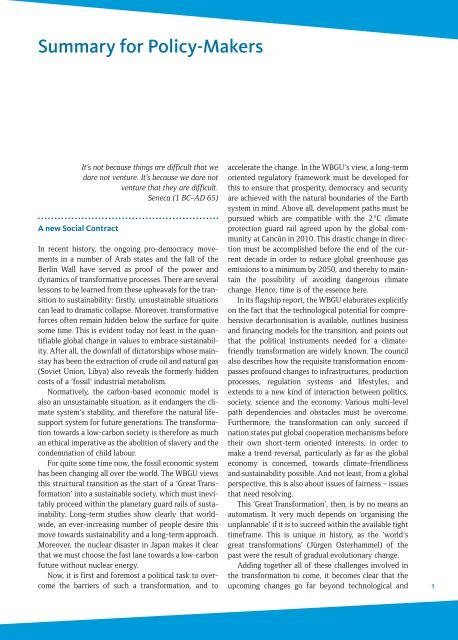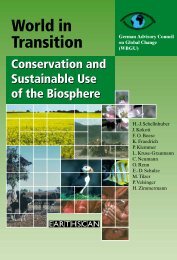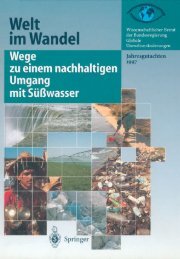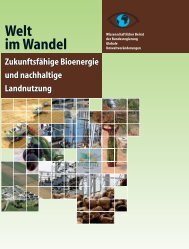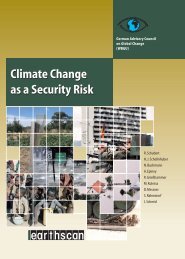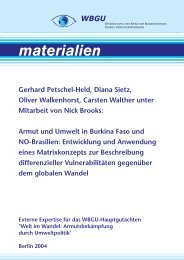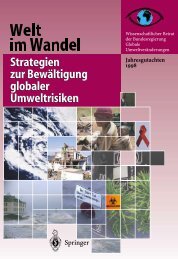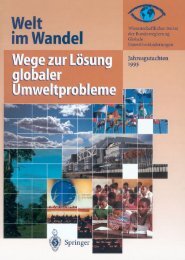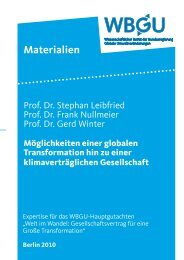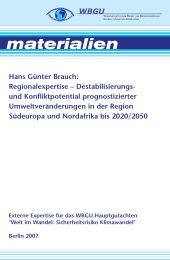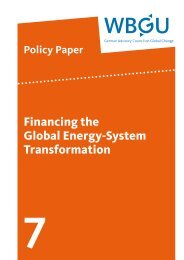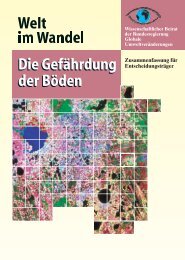World in Transition: A Social Contract for Sustainability - WBGU
World in Transition: A Social Contract for Sustainability - WBGU
World in Transition: A Social Contract for Sustainability - WBGU
Create successful ePaper yourself
Turn your PDF publications into a flip-book with our unique Google optimized e-Paper software.
Summary <strong>for</strong> Policy-Makers<br />
A new <strong>Social</strong> <strong>Contract</strong><br />
It’s not because th<strong>in</strong>gs are difficult that we<br />
dare not venture. It’s because we dare not<br />
venture that they are difficult.<br />
Seneca (1 BC–AD 65)<br />
In recent history, the ongo<strong>in</strong>g pro-democracy movements<br />
<strong>in</strong> a number of Arab states and the fall of the<br />
Berl<strong>in</strong> Wall have served as proof of the power and<br />
dynamics of trans<strong>for</strong>mative processes. There are several<br />
lessons to be learned from these upheavals <strong>for</strong> the transition<br />
to susta<strong>in</strong>ability: firstly, unsusta<strong>in</strong>able situations<br />
can lead to dramatic collapse. Moreover, trans<strong>for</strong>mative<br />
<strong>for</strong>ces often rema<strong>in</strong> hidden below the surface <strong>for</strong> quite<br />
some time. This is evident today not least <strong>in</strong> the quantifiable<br />
global change <strong>in</strong> values to embrace susta<strong>in</strong>ability.<br />
After all, the downfall of dictatorships whose ma<strong>in</strong>stay<br />
has been the extraction of crude oil and natural gas<br />
(Soviet Union, Libya) also reveals the <strong>for</strong>merly hidden<br />
costs of a ‘fossil’ <strong>in</strong>dustrial metabolism.<br />
Normatively, the carbon-based economic model is<br />
also an unsusta<strong>in</strong>able situation, as it endangers the climate<br />
system‘s stability, and there<strong>for</strong>e the natural lifesupport<br />
system <strong>for</strong> future generations. The trans<strong>for</strong>mation<br />
towards a low-carbon society is there<strong>for</strong>e as much<br />
an ethical imperative as the abolition of slavery and the<br />
condemnation of child labour.<br />
For quite some time now, the fossil economic system<br />
has been chang<strong>in</strong>g all over the world. The <strong>WBGU</strong> views<br />
this structural transition as the start of a ‘Great Trans<strong>for</strong>mation’<br />
<strong>in</strong>to a susta<strong>in</strong>able society, which must <strong>in</strong>evitably<br />
proceed with<strong>in</strong> the planetary guard rails of susta<strong>in</strong>ability.<br />
Long-term studies show clearly that worldwide,<br />
an ever-<strong>in</strong>creas<strong>in</strong>g number of people desire this<br />
move towards susta<strong>in</strong>ability and a long-term approach.<br />
Moreover, the nuclear disaster <strong>in</strong> Japan makes it clear<br />
that we must choose the fast lane towards a low-carbon<br />
future without nuclear energy.<br />
Now, it is first and <strong>for</strong>emost a political task to overcome<br />
the barriers of such a trans<strong>for</strong>mation, and to<br />
accelerate the change. In the <strong>WBGU</strong>‘s view, a long-term<br />
oriented regulatory framework must be developed <strong>for</strong><br />
this to ensure that prosperity, democracy and security<br />
are achieved with the natural boundaries of the Earth<br />
system <strong>in</strong> m<strong>in</strong>d. Above all, development paths must be<br />
pursued which are compatible with the 2 °C climate<br />
protection guard rail agreed upon by the global community<br />
at Cancún <strong>in</strong> 2010. This drastic change <strong>in</strong> direction<br />
must be accomplished be<strong>for</strong>e the end of the current<br />
decade <strong>in</strong> order to reduce global greenhouse gas<br />
emissions to a m<strong>in</strong>imum by 2050, and thereby to ma<strong>in</strong>ta<strong>in</strong><br />
the possibility of avoid<strong>in</strong>g dangerous climate<br />
change. Hence, time is of the essence here.<br />
In its flagship report, the <strong>WBGU</strong> elaborates explicitly<br />
on the fact that the technological potential <strong>for</strong> comprehensive<br />
decarbonisation is available, outl<strong>in</strong>es bus<strong>in</strong>ess<br />
and f<strong>in</strong>anc<strong>in</strong>g models <strong>for</strong> the transition, and po<strong>in</strong>ts out<br />
that the political <strong>in</strong>struments needed <strong>for</strong> a climatefriendly<br />
trans<strong>for</strong>mation are widely known. The council<br />
also describes how the requisite trans<strong>for</strong>mation encompasses<br />
profound changes to <strong>in</strong>frastructures, production<br />
processes, regulation systems and lifestyles, and<br />
extends to a new k<strong>in</strong>d of <strong>in</strong>teraction between politics,<br />
society, science and the economy. Various multi-level<br />
path dependencies and obstacles must be overcome.<br />
Furthermore, the trans<strong>for</strong>mation can only succeed if<br />
nation states put global cooperation mechanisms be<strong>for</strong>e<br />
their own short-term oriented <strong>in</strong>terests, <strong>in</strong> order to<br />
make a trend reversal, particularly as far as the global<br />
economy is concerned, towards climate-friendl<strong>in</strong>ess<br />
and susta<strong>in</strong>ability possible. And not least, from a global<br />
perspective, this is also about issues of fairness – issues<br />
that need resolv<strong>in</strong>g.<br />
This ‘Great Trans<strong>for</strong>mation’, then, is by no means an<br />
automatism. It very much depends on ‘organis<strong>in</strong>g the<br />
unplannable’ if it is to succeed with<strong>in</strong> the available tight<br />
timeframe. This is unique <strong>in</strong> history, as the ‘world‘s<br />
great trans<strong>for</strong>mations’ (Jürgen Osterhammel) of the<br />
past were the result of gradual evolutionary change.<br />
Add<strong>in</strong>g together all of these challenges <strong>in</strong>volved <strong>in</strong><br />
the trans<strong>for</strong>mation to come, it becomes clear that the<br />
upcom<strong>in</strong>g changes go far beyond technological and<br />
1


